EmailTooltester is supported by readers like yourself. We may earn a commission when you purchase through our links. Of course, this won't increase the cost for you.
The Brevo email marketing platform tends to draw praise from small and medium businesses for its affordability and ease of use. Meanwhile, its competitor, Klaviyo, has ecommerce-focused features that make it popular with online store owners.
At EmailTooltester, we know Brevo very well because we regularly use it for our email newsletter. But with Klaviyo being one of the top choices for ecommerce email marketing, we’ve also extensively tested it to suss out its pros and cons.
So, which email platform is right for you? Let’s find out.
Who Are Brevo and Klaviyo Best For?
Between Brevo and Klaviyo, Brevo is easier to use and offers more value for money, making it a good choice for general small-to-medium businesses — especially those on a tight budget.
Klaviyo’s wider range of email templates and ecommerce-oriented automations will appeal to ecommerce stores wanting to nurture casual users into loyal customers.
Brevo vs Klaviyo: Pros and Cons
Here’s a TL;DR summary of Brevo’s and Klaviyo’s pros and cons before I share my thoughts on their features in detail:
Brevo
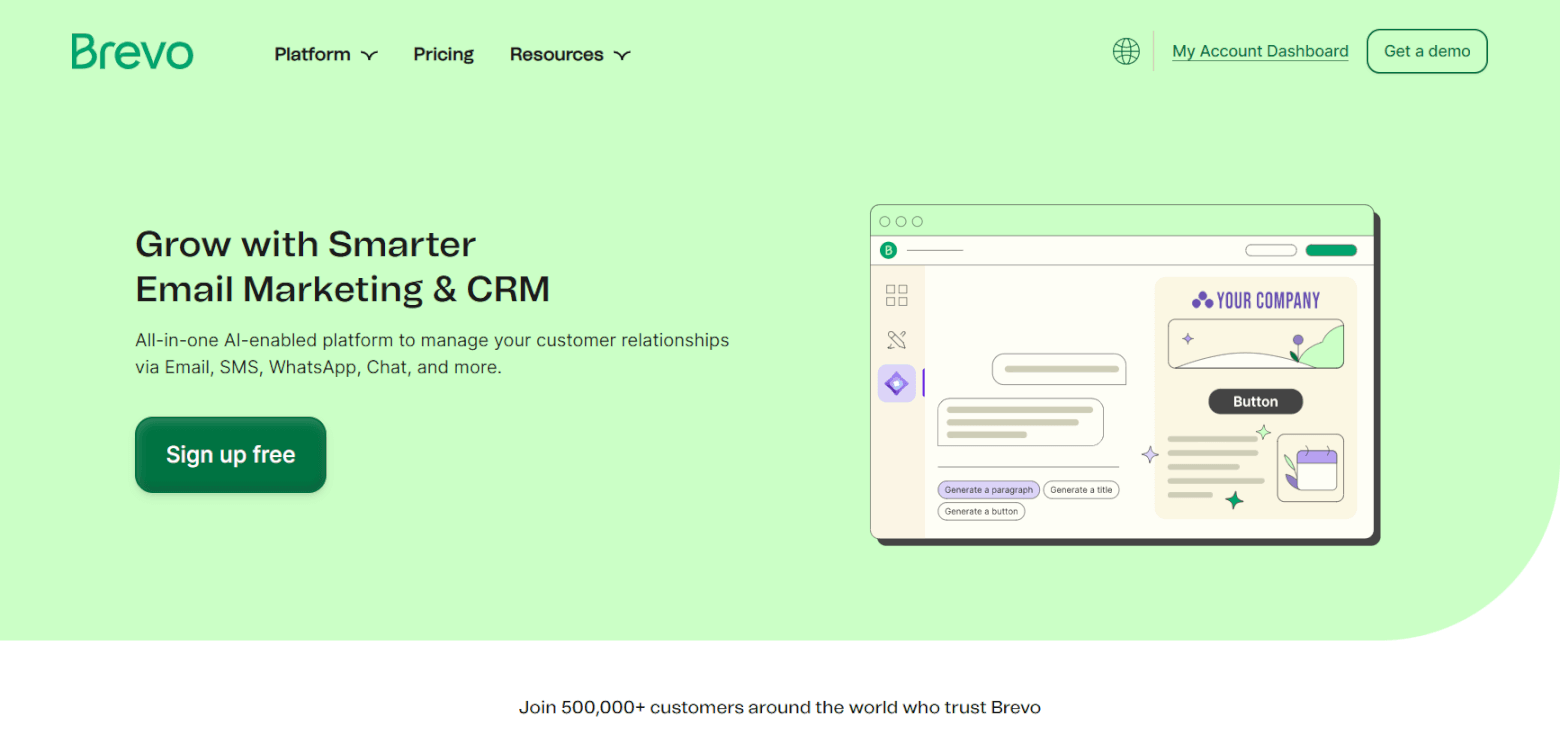
Brevo Pros:
- Easy-to-use interface
- Value-for-money pricing
- Supports many marketing channels
Brevo Cons:
- Support not as comprehensive as Klayiyo's – they don't offer live chat or migration support, and deliverability support is also limited
- Significant price jump from the Standard plan to the Professional plan
Learn more in our video review:
We’ve also got a Brevo tutorial for setting up your email marketing efforts in the platform for success.
Klaviyo
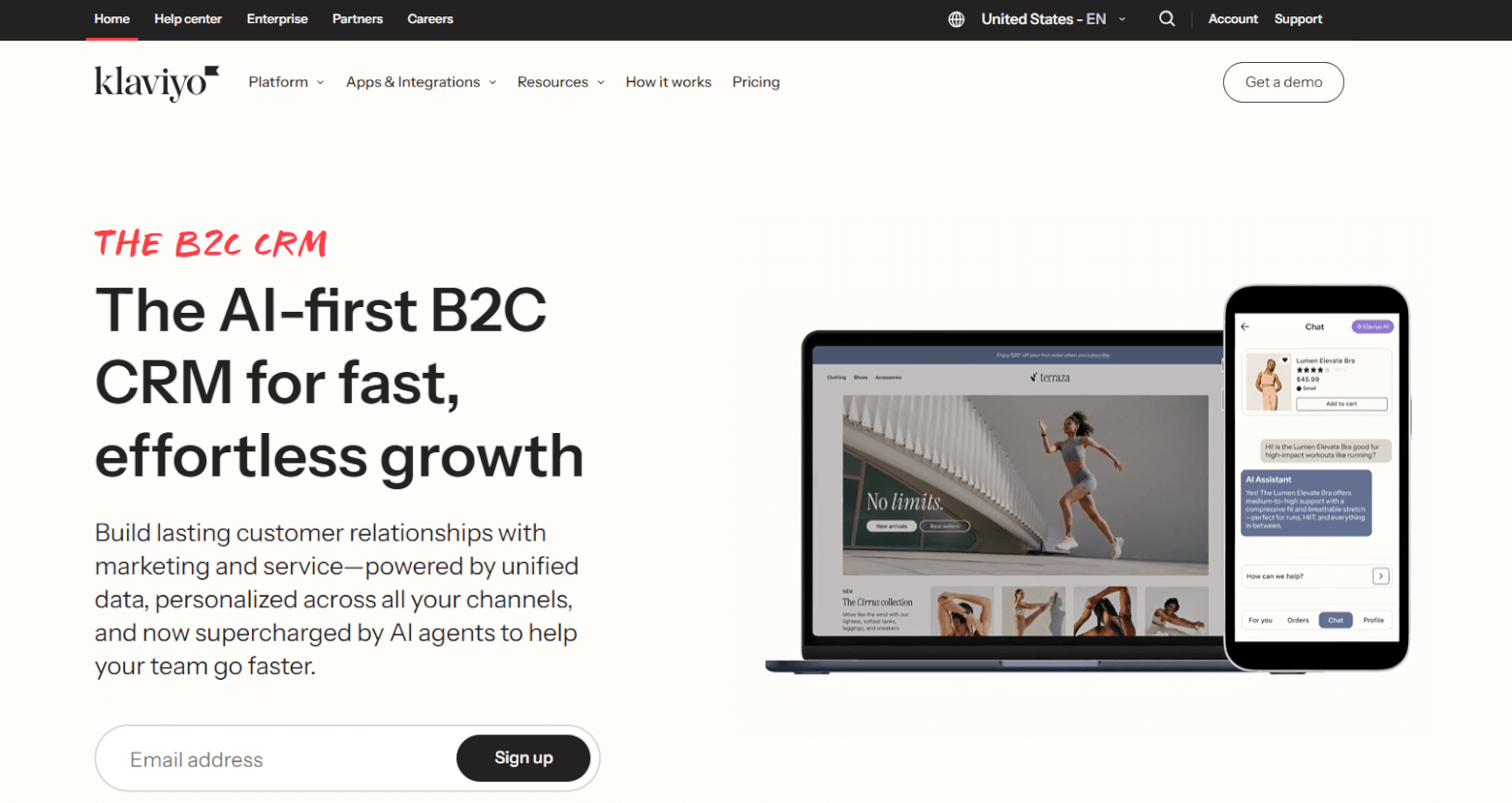
Klaviyo Pros:
- Suited for ecommerce email marketing
- Wide range of email templates
- Strong deliverability support
Klaviyo Cons:
- Segment builder can be difficult to use
- No sales pipeline
Learn more in our video review:
Alternatively, read our Klaviyo tutorial to learn how to get started with the platform.
Brevo vs Klaviyo: Main Differences
From my research, the main differences between Brevo and Klaviyo are:
1. Pricing
While Klaviyo charges based on the number of active profiles you have, Brevo charges for the number of emails you send. Brevo’s generous email send allowance (starting from 5,000 monthly email sends for paid plans) means that sending marketing emails with Brevo could potentially be much cheaper than using Klaviyo.
2. Ecommerce features
With its ecommerce focus, Klaviyo has more ecommerce email marketing features than Brevo. These include the syncing of product reviews to your campaigns and a wider variety of ecommerce automation triggers.
3. Sales pipeline availability
Brevo's CRM offers a sales pipeline for tracking deals through pipeline stages, while Klaviyo doesn’t. This may be a deal-breaker if your business does high-touch sales.
More details on these when you read on…
Ease of Use
Brevo is a pleasure to use. The interface is intuitive to navigate, where you can conveniently access the platform’s main tabs from the left sidebar.
From our own experience, it’s one of those tools you can jump into and start building a campaign within minutes. Everything feels where you expect it to be.
I like how key actions, like creating campaigns and automations, are formatted as big, unmissable buttons.
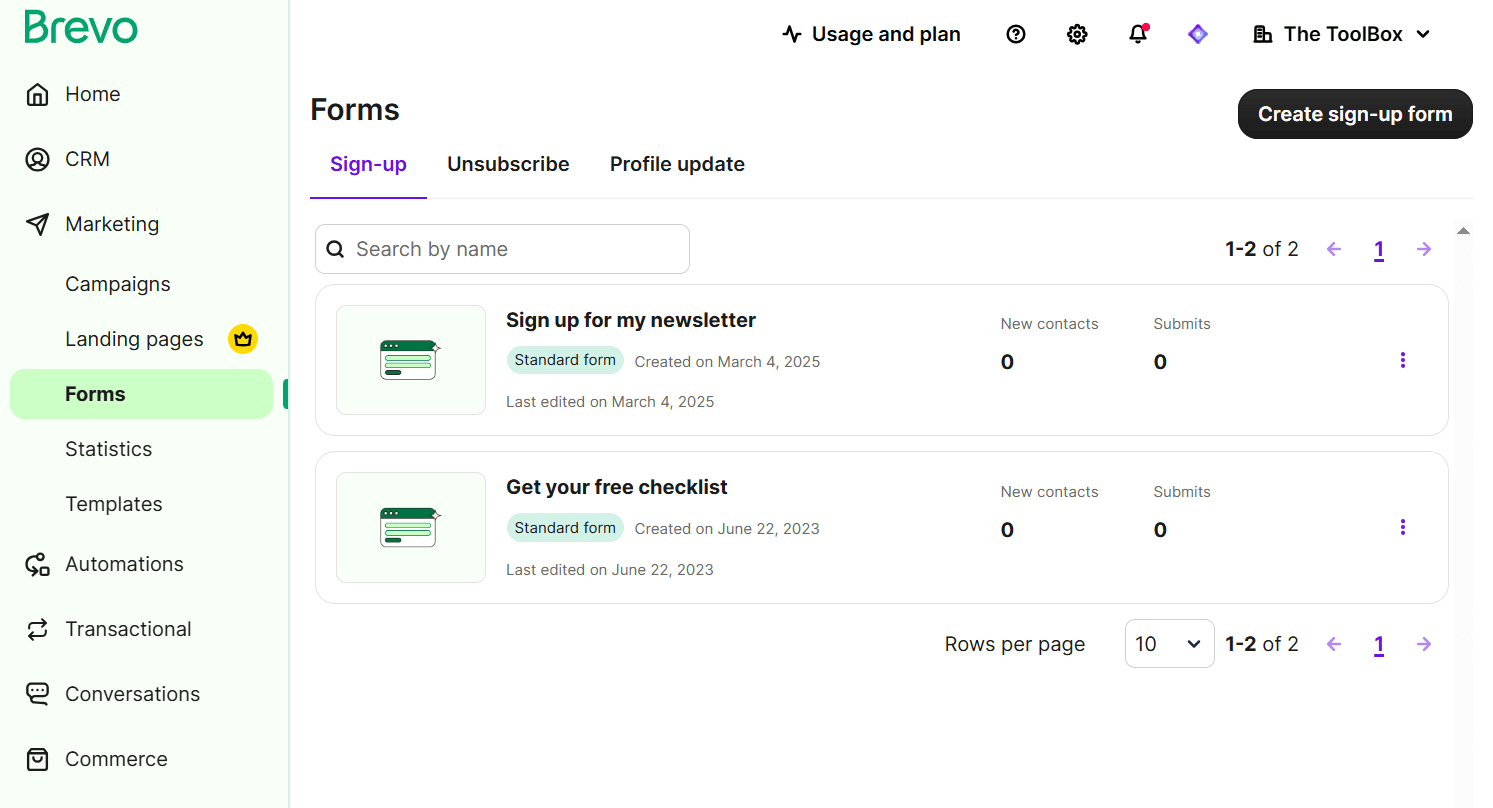
Klaviyo is also generally intuitive and easy to use. Like Brevo, all the main options are located on the left, with drop-down menus revealing secondary options. There are also big call-to-action buttons for key actions.
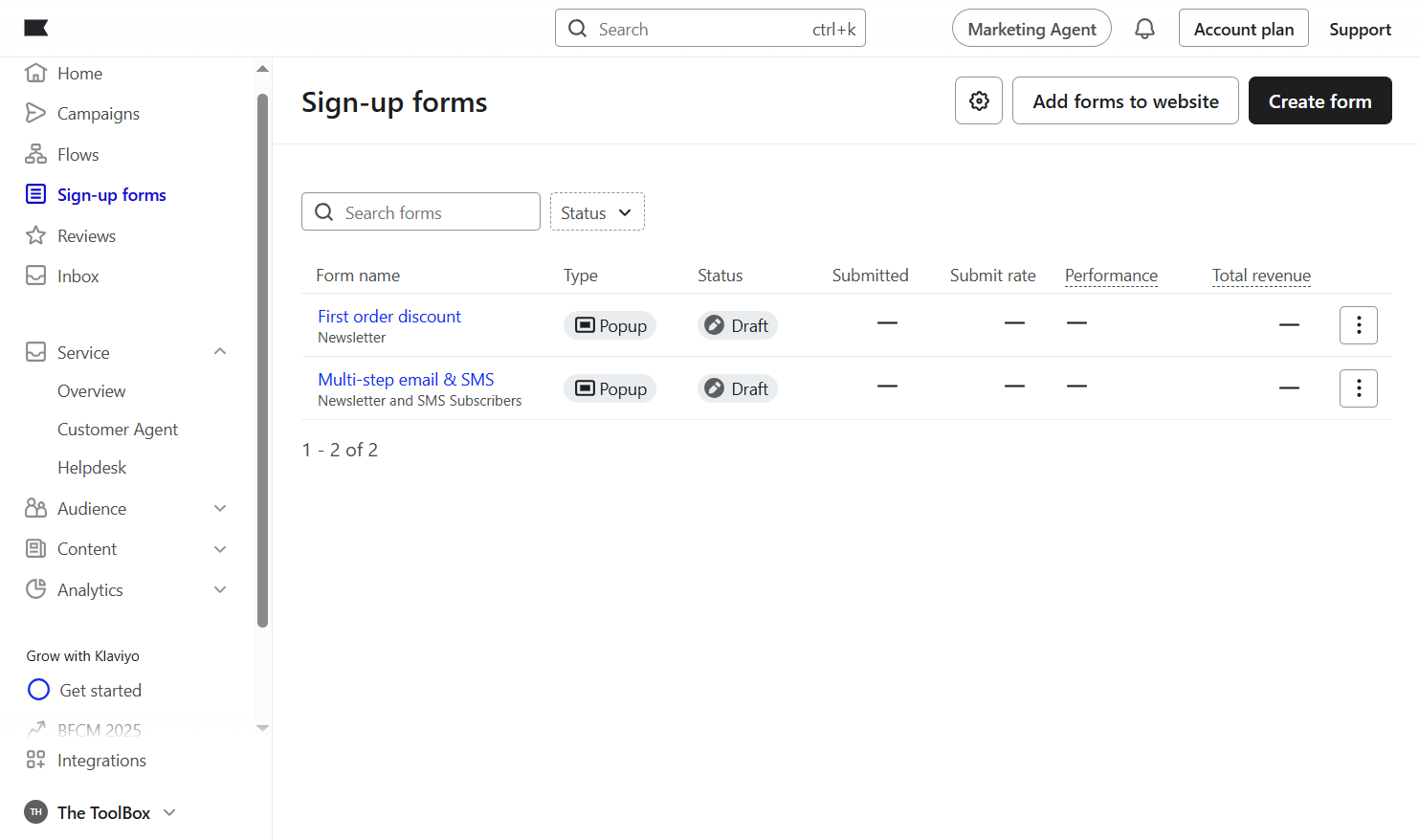
That said, Klaviyo uses some unique email marketing terminology, which you may take some time to get used to. For example:
- “Active profiles” refers to contacts who have opted in to email marketing.
- “Flows” refers to email automations (meanwhile, there’s a separate “Automations” feature under the “Content” drop-down that refers to text-message-based automations).
In addition, the learning curve for building segments can be steep, seemingly needing basic programming knowledge.
For example, the average small business owner might not know what the “Boolean” data type in the “Properties about someone” segment filter means. 😅
Winner: Brevo takes the first round with its user-friendly interface!
Brevo 1 – Klaviyo 0
Email Templates and Design Flexibility
Brevo offers two types of pre-built email templates: basic templates and ready-to-use ones. You can also use templates you created previously or reuse the design of previous campaigns.
There are five basic templates offering placeholders for logos, images, and text. Meanwhile, the ready-to-use templates (more than 45 in all) contain sample images and copy — perfect if you want a clearer idea of the final campaign’s look.
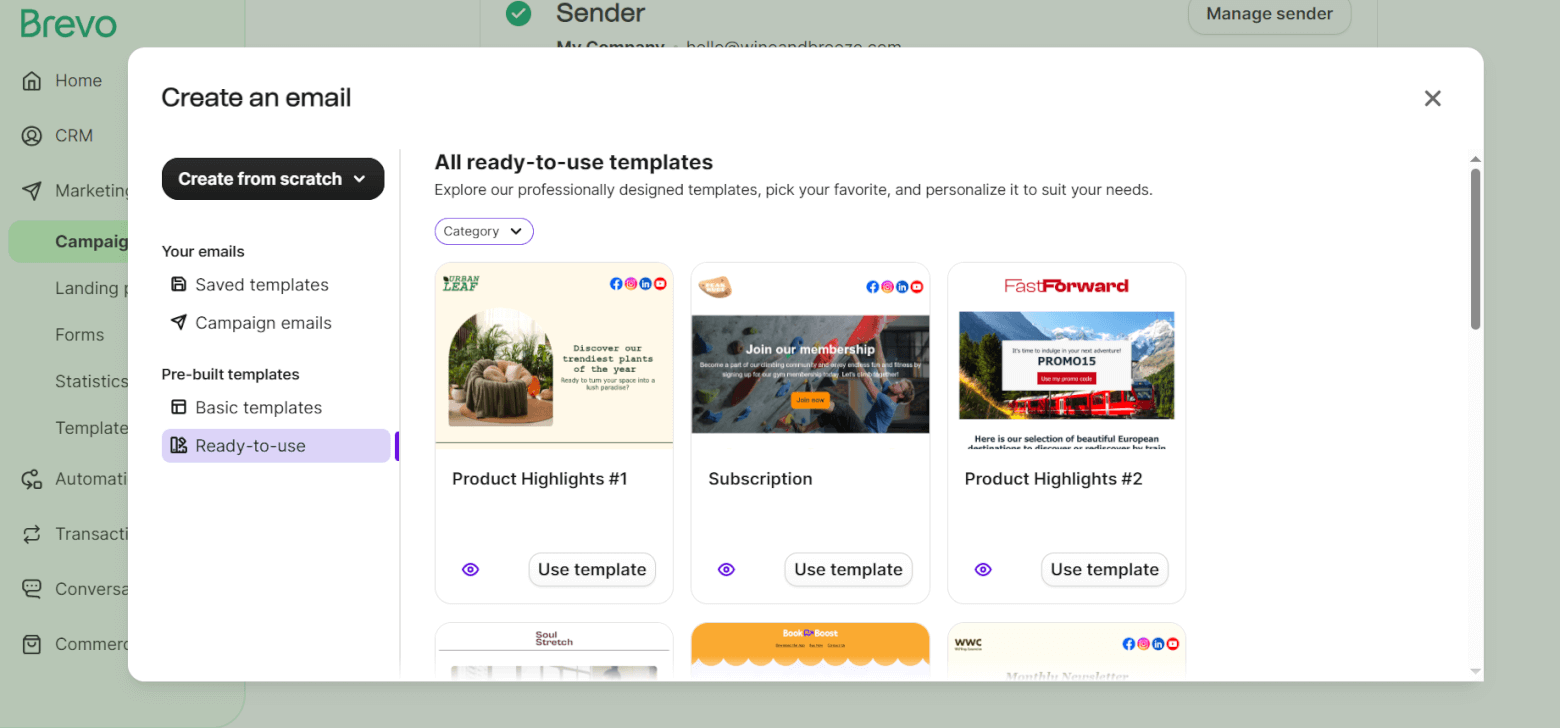
Design flexibility-wise, Brevo offers a modest number of blocks for typical email content, like text, images, buttons, and videos. You can also add ecommerce store products. Just drag and drop your preferred blocks into the campaign.
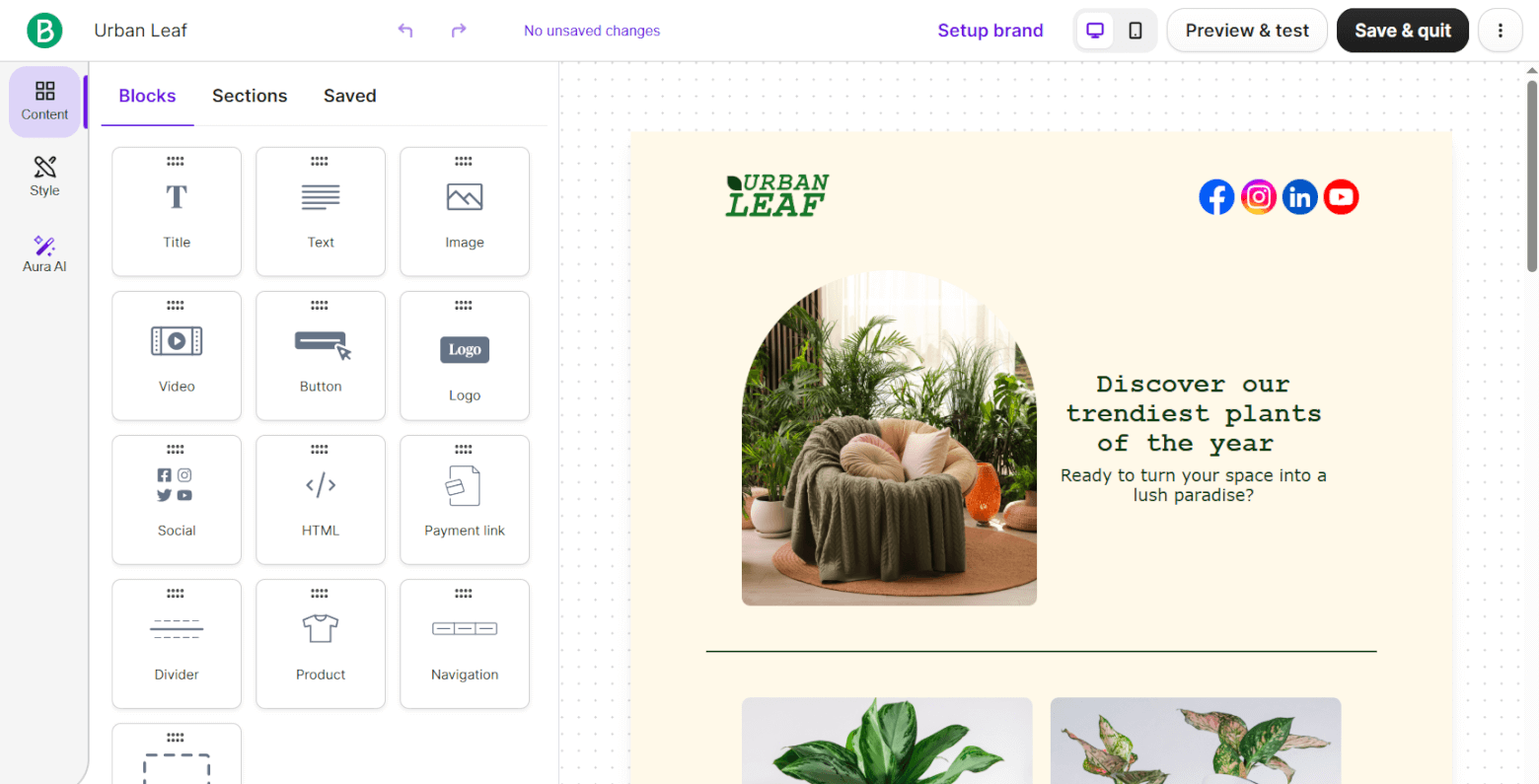
In contrast, Klaviyo offers a much larger selection of email templates, with many of them created by Klaviyo partners. I couldn’t count them all. But there are a lot.
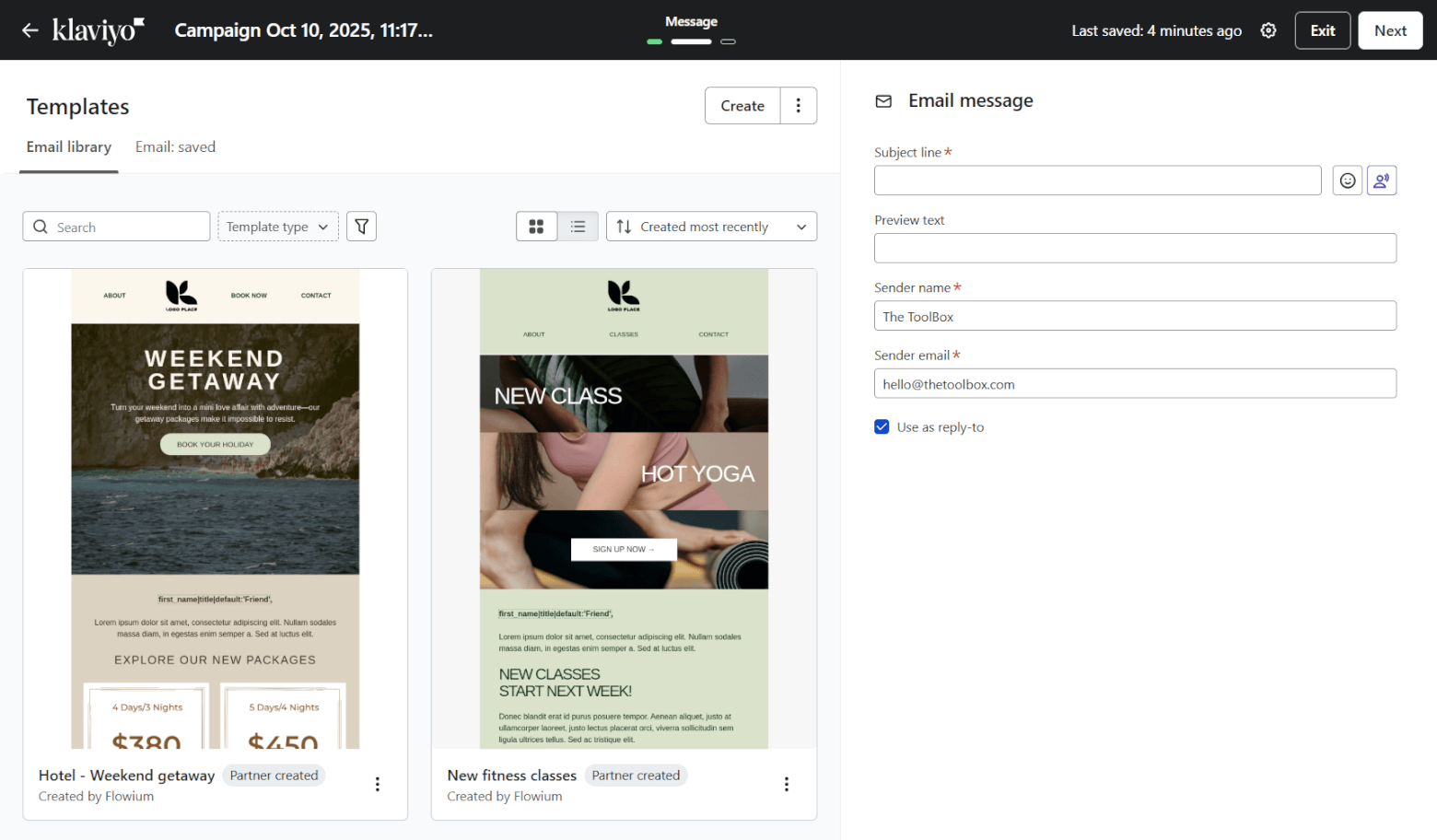
There are also basic layouts with simple text and image placeholders.
Klaviyo has a similar range of drag-and-drop email content blocks. This includes a product block for adding products.
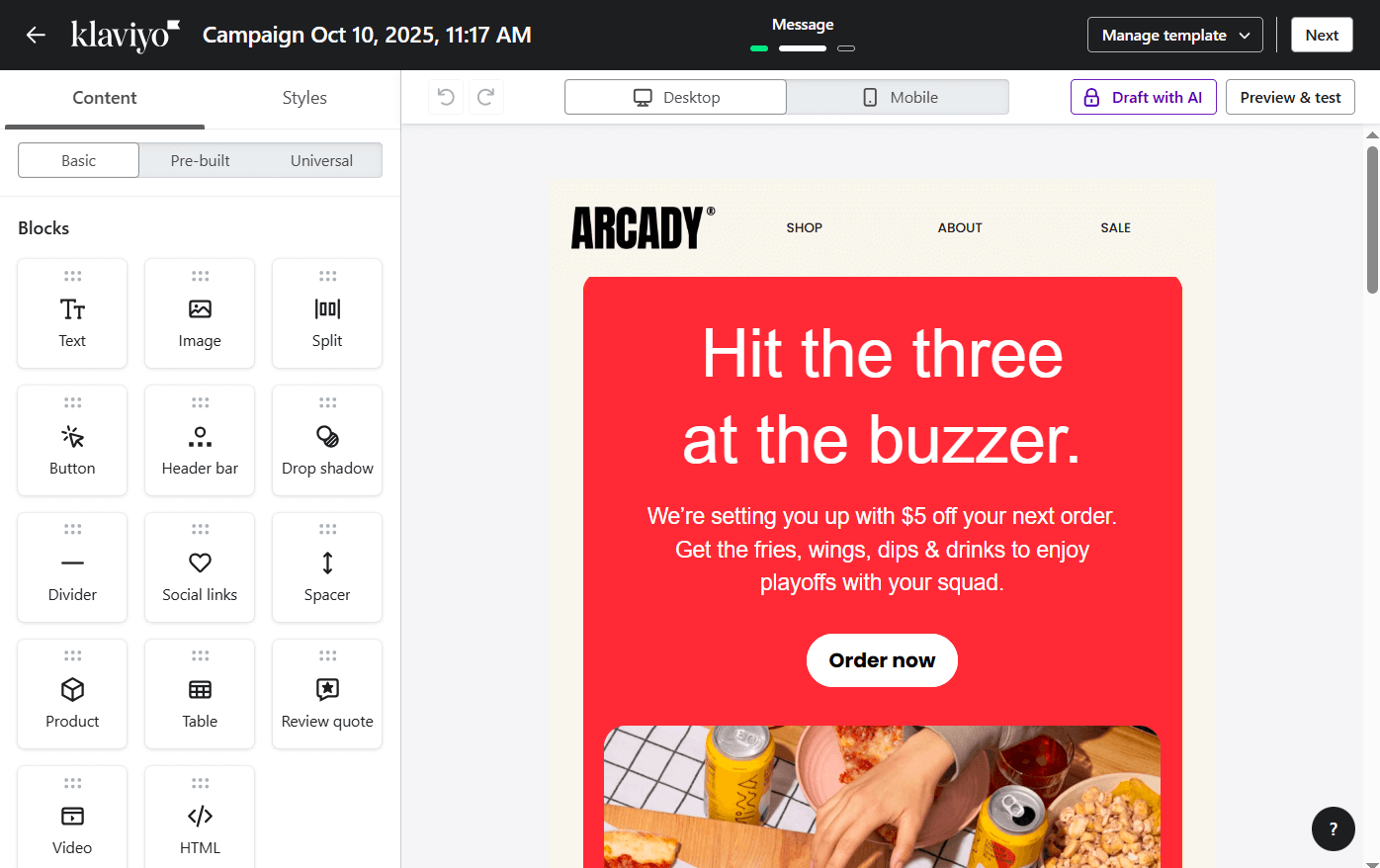
Of note, though, is the review quote block, which Brevo doesn’t offer. This block lets you sync Shopify or WooCommerce customer reviews from your store to your Klaviyo emails. (Paid Klaviyo Reviews add-on needed.)
Winner: Klaviyo wins hands down, for supporting more email templates and ecommerce content blocks!
Brevo 1 – Klaviyo 1
Automations
Similar to its campaign editor, Brevo uses a drag-and-drop automation builder, where you drag and drop automation components into the canvas.
Dragging and dropping feels snappy, and there’s a nice collection of triggers, actions, and rules to choose from. These include ecommerce-related triggers for sending automated emails when contacts update or delete their carts.
For example, I built this simple abandoned cart automation in Brevo:
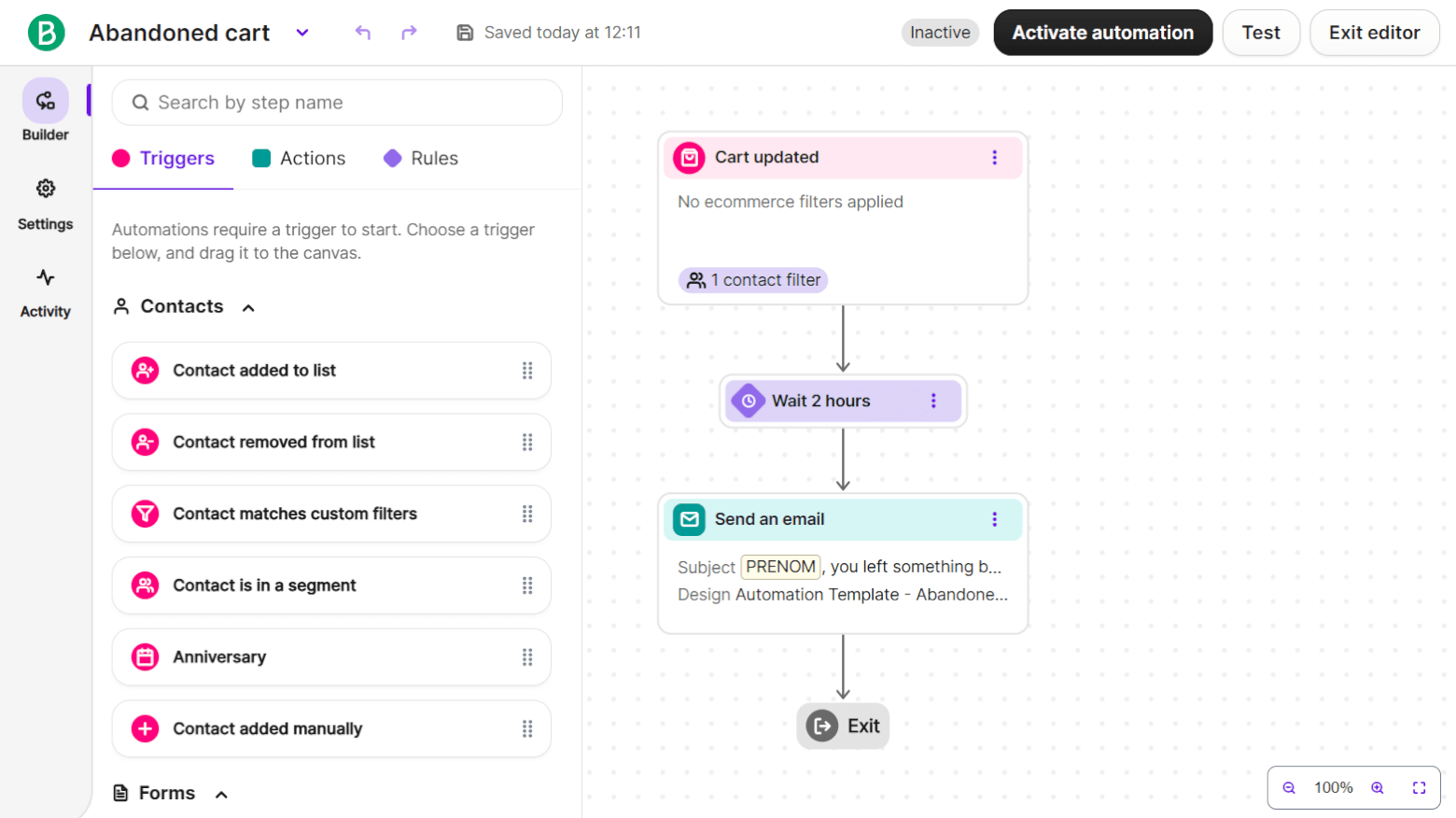
In Klaviyo, automations are called “flows,” and you can also drag and drop flow components into the builder.
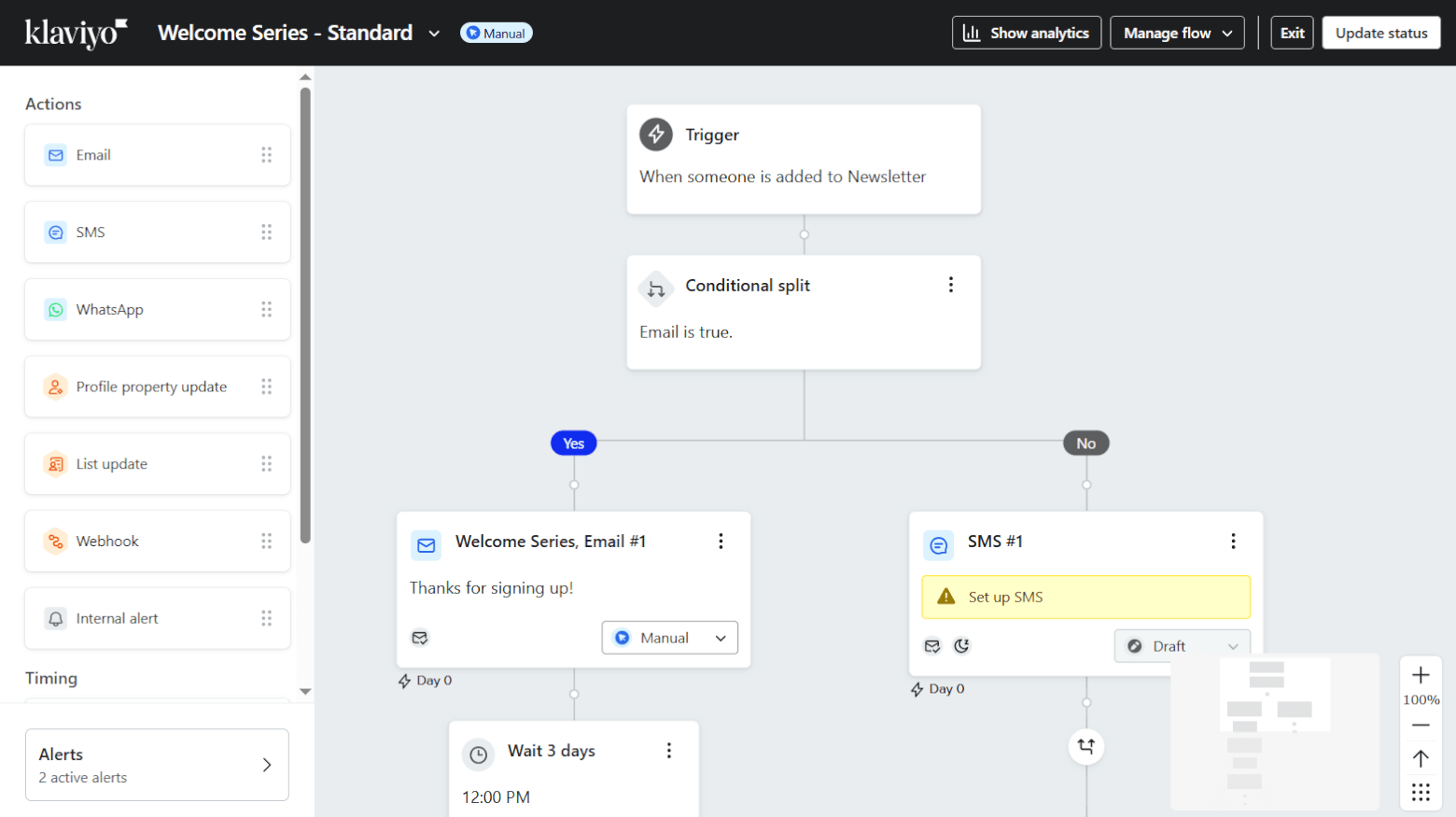
Klaviyo supports more ecommerce triggers: there are the standard ones like “Started Checkout,” and “Placed Order,” but you can also set up marketing automations that trigger during price drops or when a product is low in stock.
As a whole, though, Klaviyo has fewer automation triggers, actions, timing, and logic options than Brevo. What’s more, each flow can have only one trigger. You may end up having to (tediously) manage duplicate flows if you need the same automated actions to happen for different trigger events.
Winner: Brevo’s automation builder is more powerful for general use. But if you run an ecommerce store, you might find Klaviyo’s flow builder more suitable for setting up ecommerce automations. This round ends in a tie.
Brevo 2 – Klaviyo 2
Segmentation and Personalization
Segmenting contacts — meaning, automatically grouping your contacts based on their shared characteristics — helps you personalize your email messaging for each group.
Brevo offers segment templates for certain common scenarios, like contacts who signed up within the last 30 days. They’re convenient if you want segments for these scenarios. Otherwise, you can DIY your segments with Brevo’s segment filters.
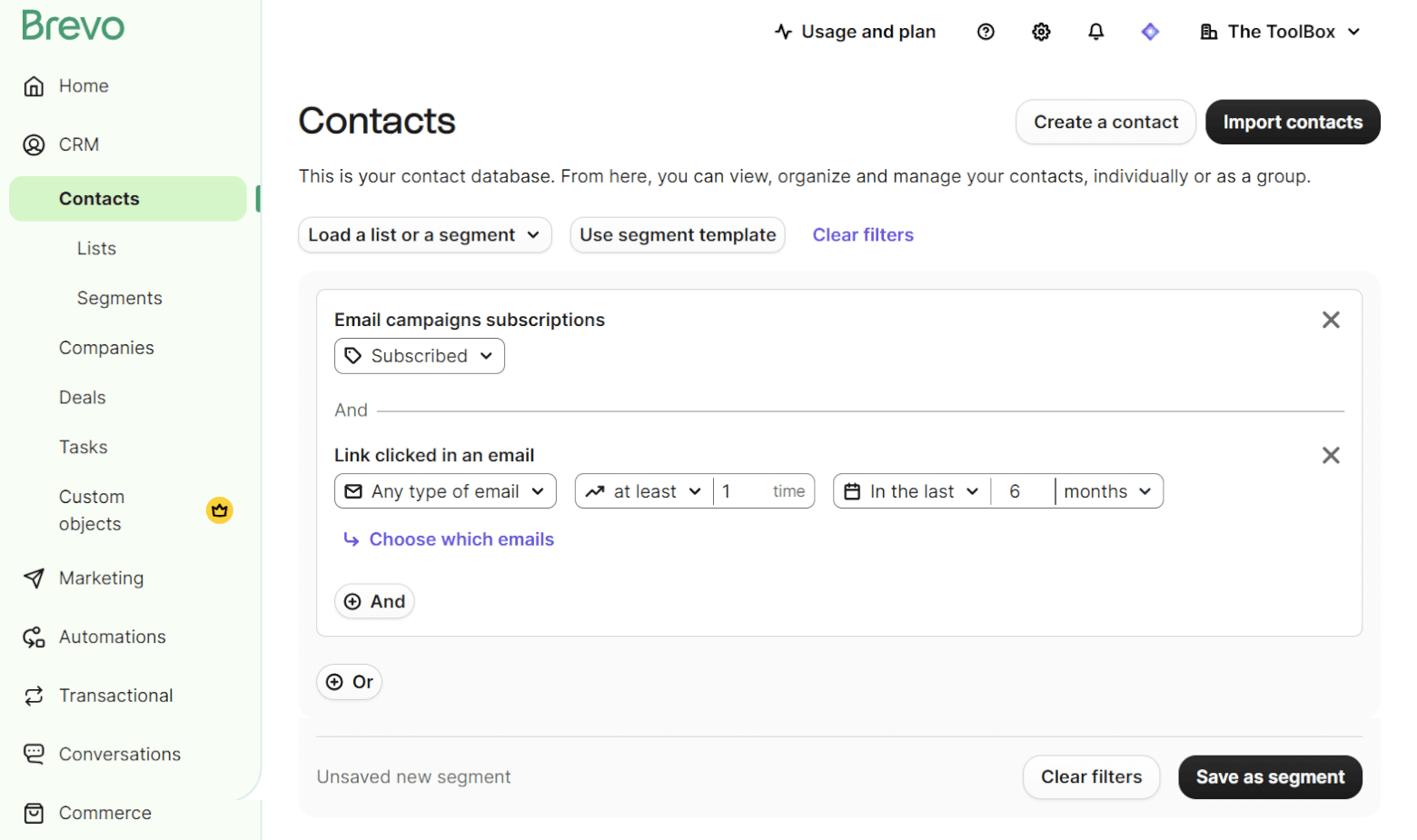
There are many filters to choose from, including your contacts’ details, email activity, and deal events. You can also add multiple segment conditions.
For instance, you can have a segment of contacts (1) who signed up within the last 90 days, and (2) who haven’t clicked any email link in the same period.
Klaviyo provides many segmenting options, but it seems there are fewer than Brevo. What’s more, non-techies may struggle to use the platform’s segment builder, as mentioned earlier in this review’s “Ease of use” section.
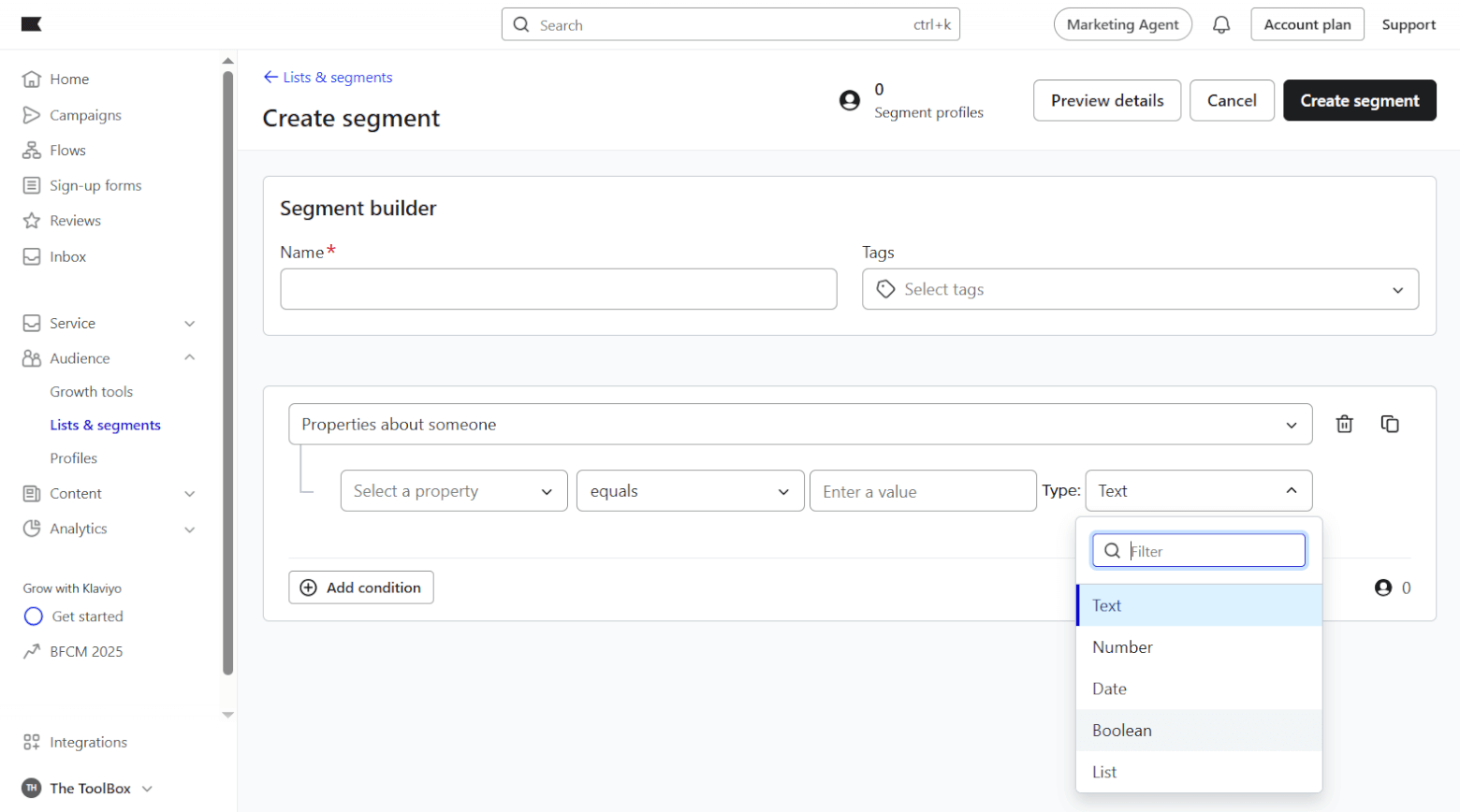
Winner: Brevo wins this round, for its more flexible and easier-to-use segmenting capabilities.
Brevo 3 – Klaviyo 2
Omnichannel Marketing
Brevo and Klaviyo are both good omnichannel marketing platforms, supporting a range of marketing channels apart from email.
Here’s a quick comparison:
| Brevo | Klaviyo | |
|---|---|---|
| SMS and MMS | ✔️ | ✔️ |
| RCS (rich communication services) | ❌ | ✔️ (in paid private beta as of time of writing) |
| ✔️ | ✔️ | |
| Live chat | ✔️ | ❌ |
| Web notifications | ✔️ | ❌ |
| Mobile app push notifications | ✔️ | ✔️ |
Totaling up the check marks and crosses, Brevo supports more marketing channels than Klaviyo. But if you want to reach contacts via RCS, you’d need to use Klaviyo.
Winner: It’s Brevo, for having more omnichannel options. If you’re especially keen on omnichannel marketing, check out our guide to the best omnichannel software.
Brevo 4 – Klaviyo 2
CRM and Contact Management
Brevo and Klaviyo do well in terms of contact management. Their interfaces differ, but click into any contact, and you’ll see a dashboard of key contact data, interaction activity, and metrics like email open rate.
For example, here’s Brevo’s:
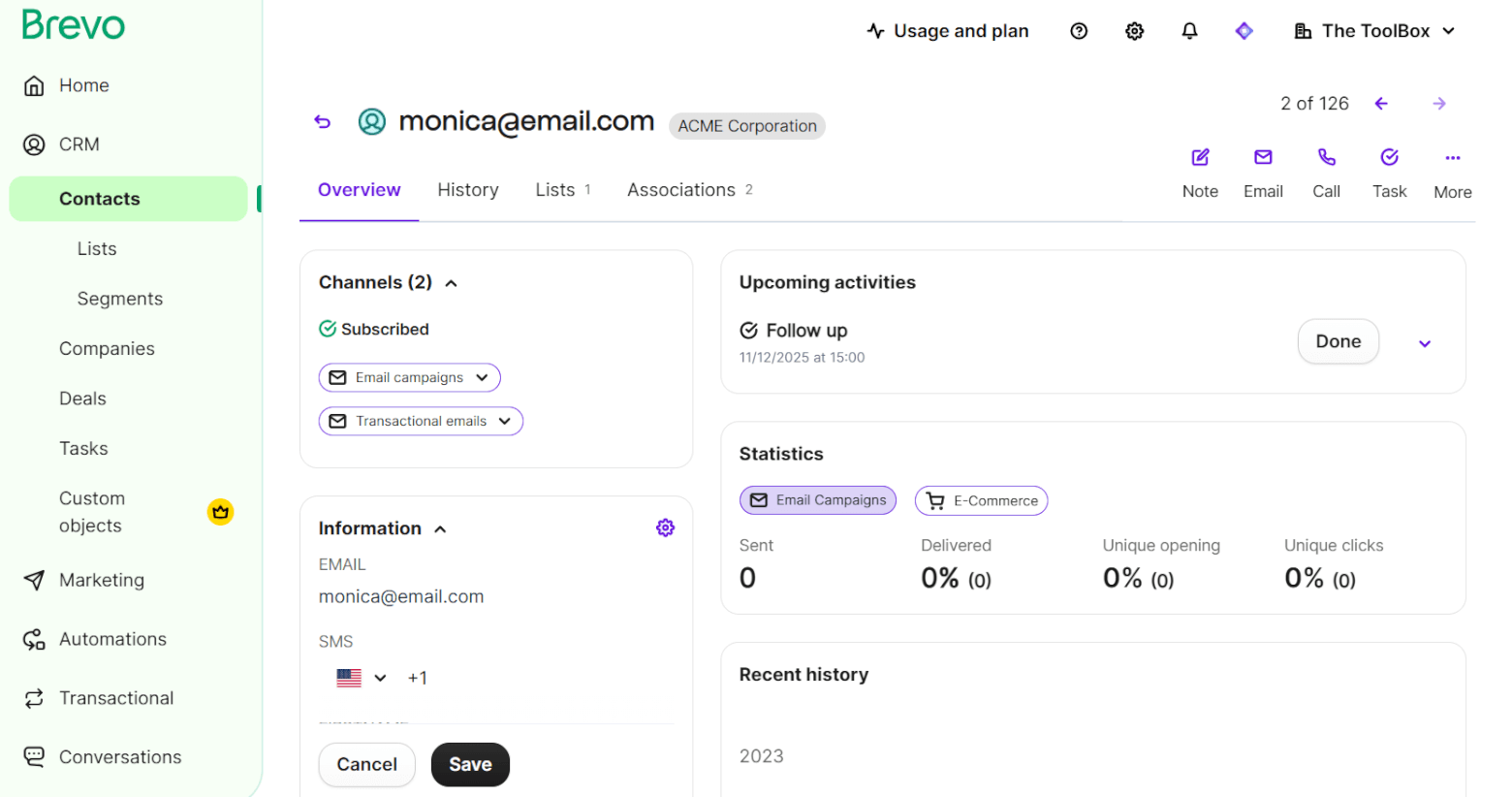
And here’s Klaviyo’s.
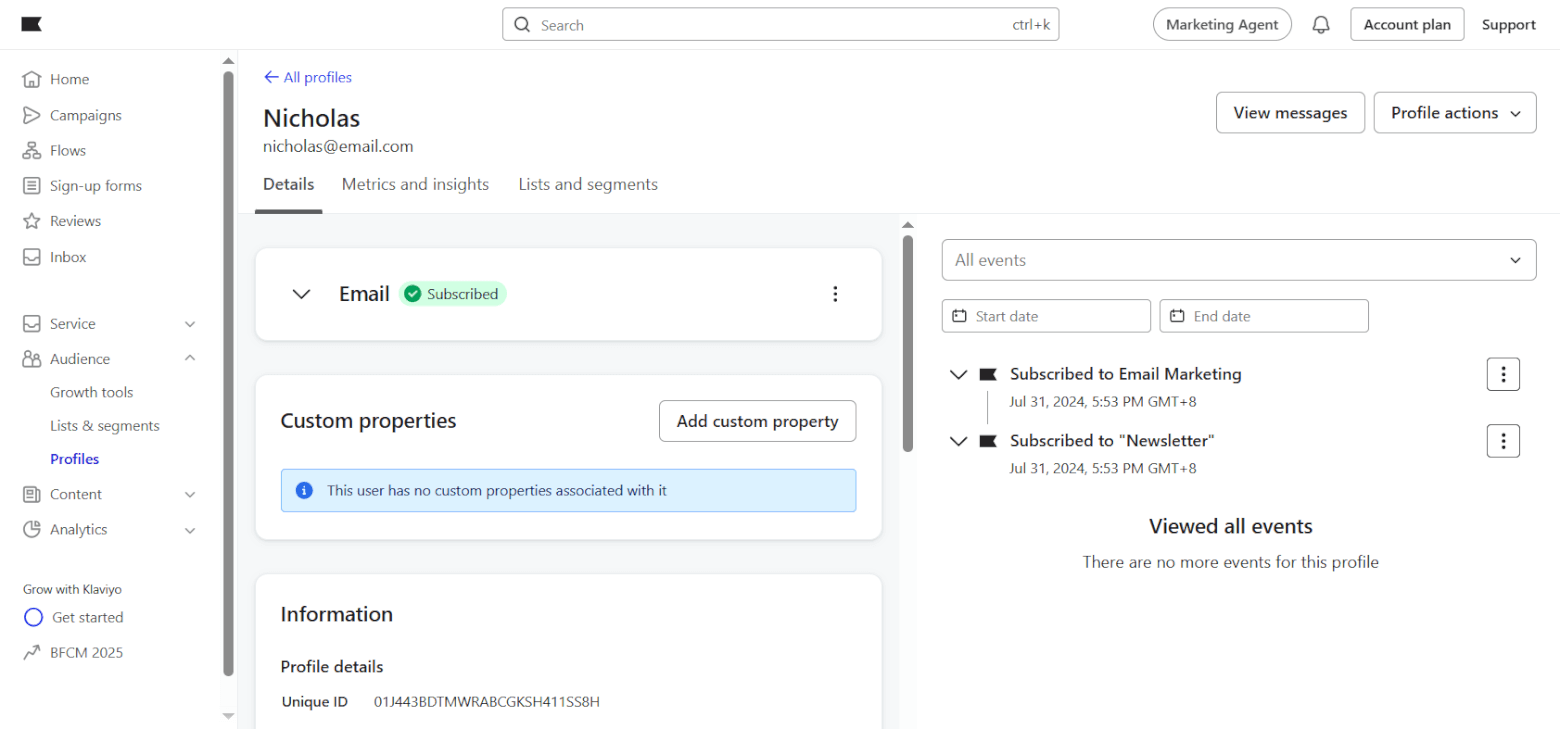
But if you want to go one step further by tracking sales activity in stages, you’ll need an email service provider with CRM (customer relationship management) features.
In Brevo, you get a kanban-style sales pipeline for viewing sales deals across pipeline stages. You can update your deals’ stages by dragging and dropping them along the pipeline, but I recommend setting up an automation to automate this work.
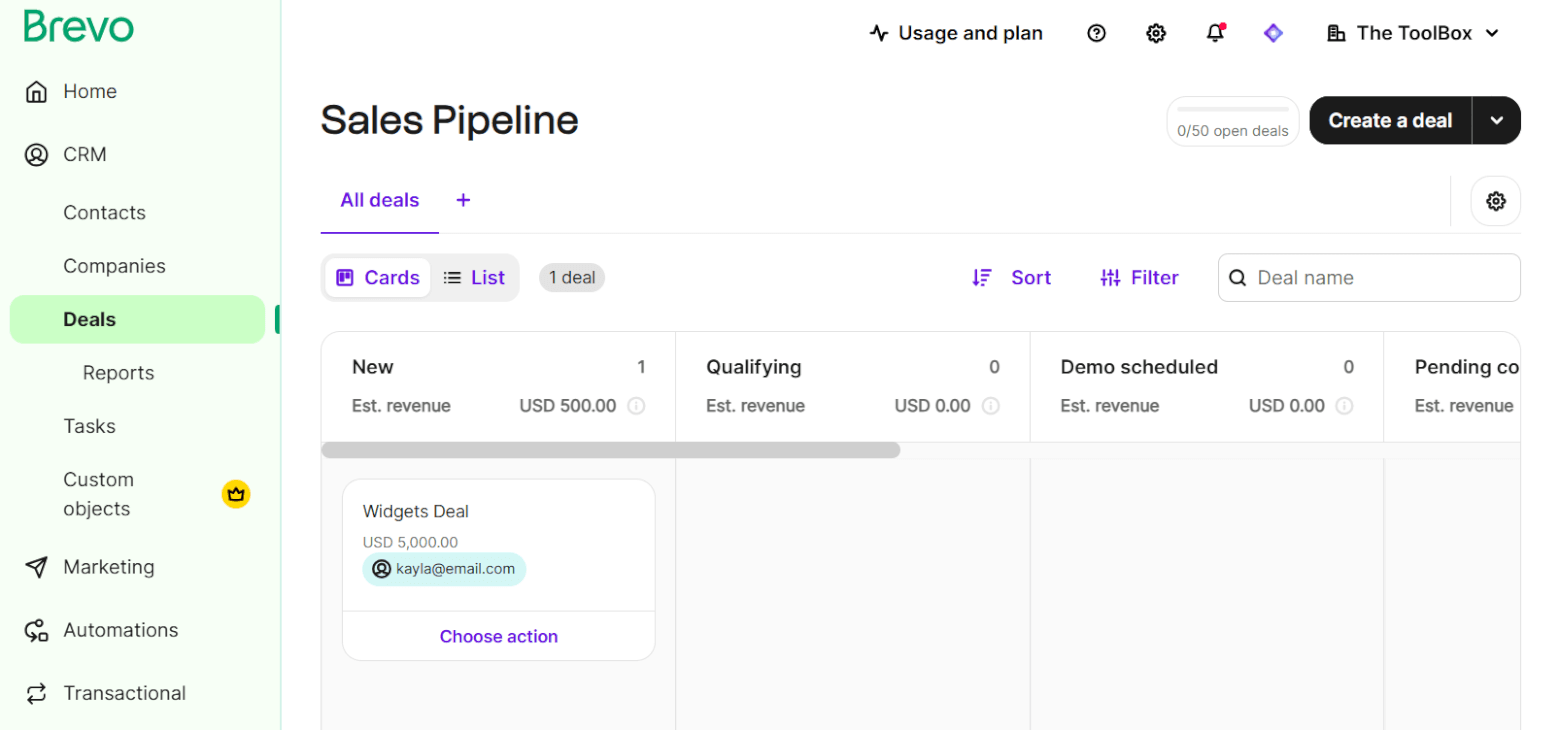
As a B2C CRM platform, Klaviyo doesn’t offer a sales pipeline view. This makes sense given the platform’s focus on serving B2C ecommerce stores, which generally don’t track deals across pipeline stages.
But if your business needs a sales pipeline because it actively guides prospects through each stage of the sales process, for example, Klaviyo might not work for you.
Winner: Both Brevo and Klaviyo have good contact management features, but Brevo wins this round for having a sales pipeline while Klaviyo doesn’t.
Brevo 5 – Klaviyo 2
AI Features
Since AI is all the rage now, email marketing services have been racing to soup up their features with AI — and Brevo and Klaviyo are no different.
If you can’t think of an attention-grabbing subject line, for instance, Brevo can write one for you with AI. Likewise for the main email copy, where AI can help you:
- Write new email content.
- Rewrite existing content.
- Check for spelling and grammar mistakes.
- Translate your copy, and more.
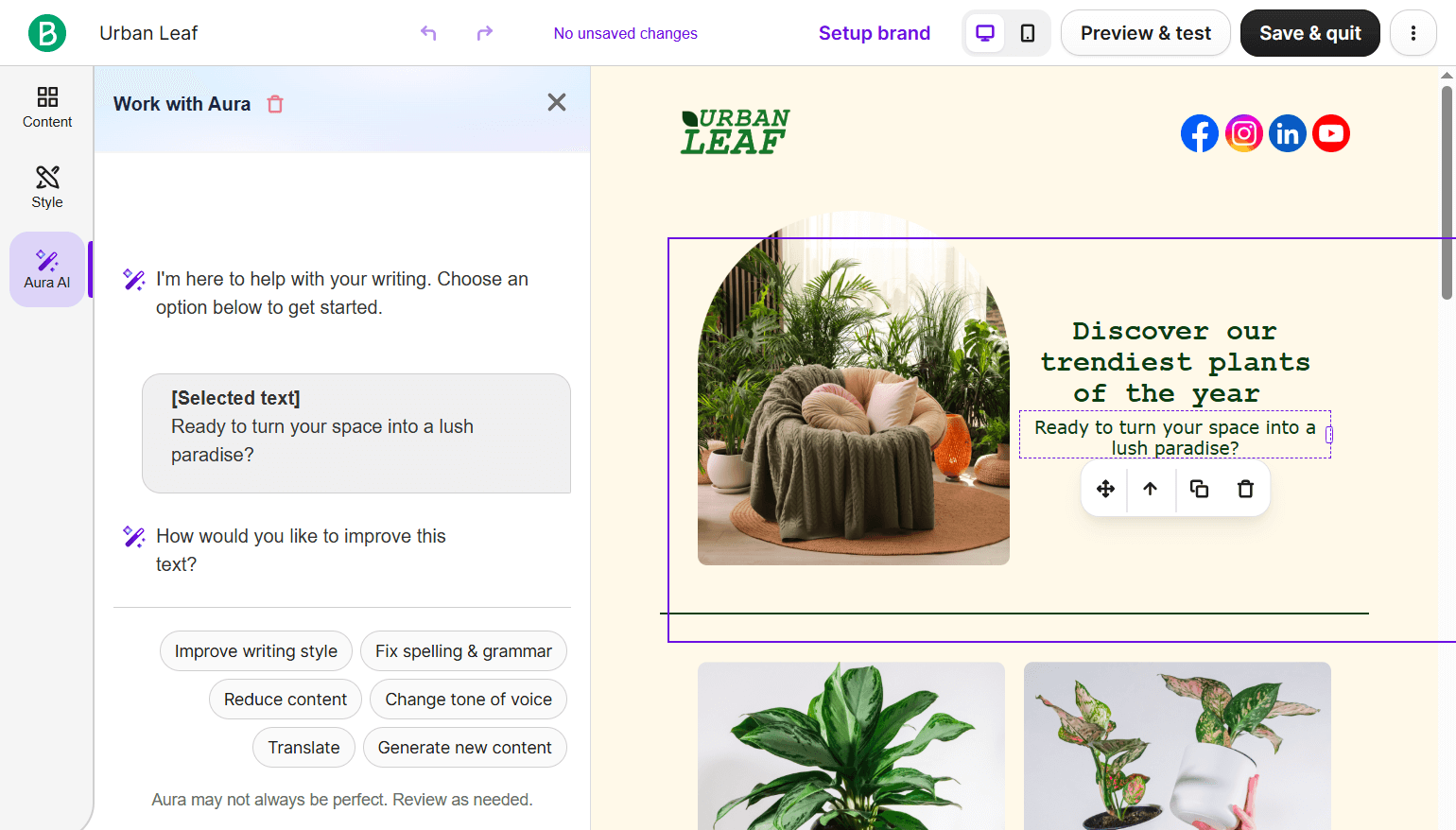
Then, when you’re ready to send your email, have Brevo’s AI determine the best send time for maximum email opens and engagement.
Apart from AI email features, Brevo has AI tools for creating contacts and deals, and summarizing live chat conversations, among others.
Klaviyo also packs many AI features — it claims to have over 40!
Just like Brevo, you can write Klaviyo campaign subject lines and copy, and optimize your send times, with AI. You can also describe the segment or flow you need to have AI build it for you.
Then, to boost conversions and revenue, add Klaviyo’s AI-powered product blocks to your campaigns. They’ll display products tailored to your recipients’ preferences, which your recipients may be more likely to click and buy.
Winner: Brevo and Klaviyo both offer a respectable variety of AI features, so this round ends in a tie.
Brevo 6 – Klaviyo 3
Deliverability
Brevo and Klaviyo offer a similar range of deliverability features. These include:
- Domain authentication (including the addition of DKIM and DMARC records)
- A deliverability hub that shows your deliverability score
- Automatic blocklisting of bounced email addresses
But Klaviyo’s deliverability features generally have wider scopes. For instance, Klaviyo’s deliverability hub shows more detailed deliverability score reports.
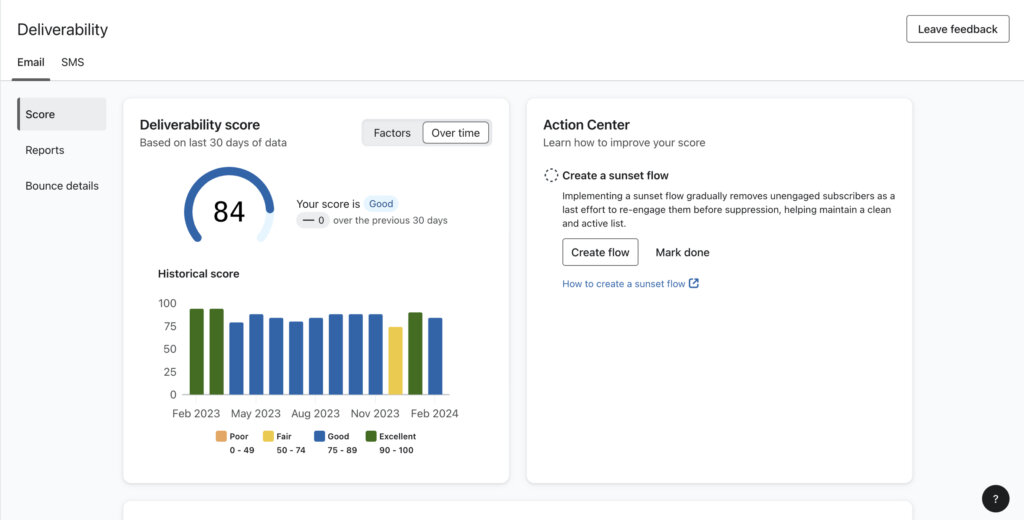
Plus, regardless of your base Klaviyo plan, you can add a premium support package to get VIP deliverability services. These services include proactive deliverability monitoring and quarterly deliverability performance reviews.
On Brevo, only Professional plan users can get yearly three-hour access to a deliverability specialist.
One minor thing to note: both Brevo and Klaviyo don’t support full SPF alignment for shared IP addresses.
In other words, if you use either platform’s shared IP addresses to send emails (which is the case if you don’t pay for a dedicated IP address), your emails’ “Return-Path” email address will show a Brevo/Klaviyo-managed domain instead of your own.
This generally isn’t an issue, because emails can pass DMARC checks — which influence deliverability — with either SPF or DKIM alignment.
Brevo and Klaviyo both provide settings for using your own domain for your emails’ DKIM records. So, when you set up your domain accordingly, your emails will be DKIM-aligned and will pass DMARC checks.
Winner: Klaviyo wins this round for its more in-depth deliverability support!
Brevo 6 – Klaviyo 4
Integrations
Brevo and Klaviyo are closely tied in the integrations department. They both offer over 300 integrations — 330+ for Brevo and 350+ for Klaviyo, to be exact.
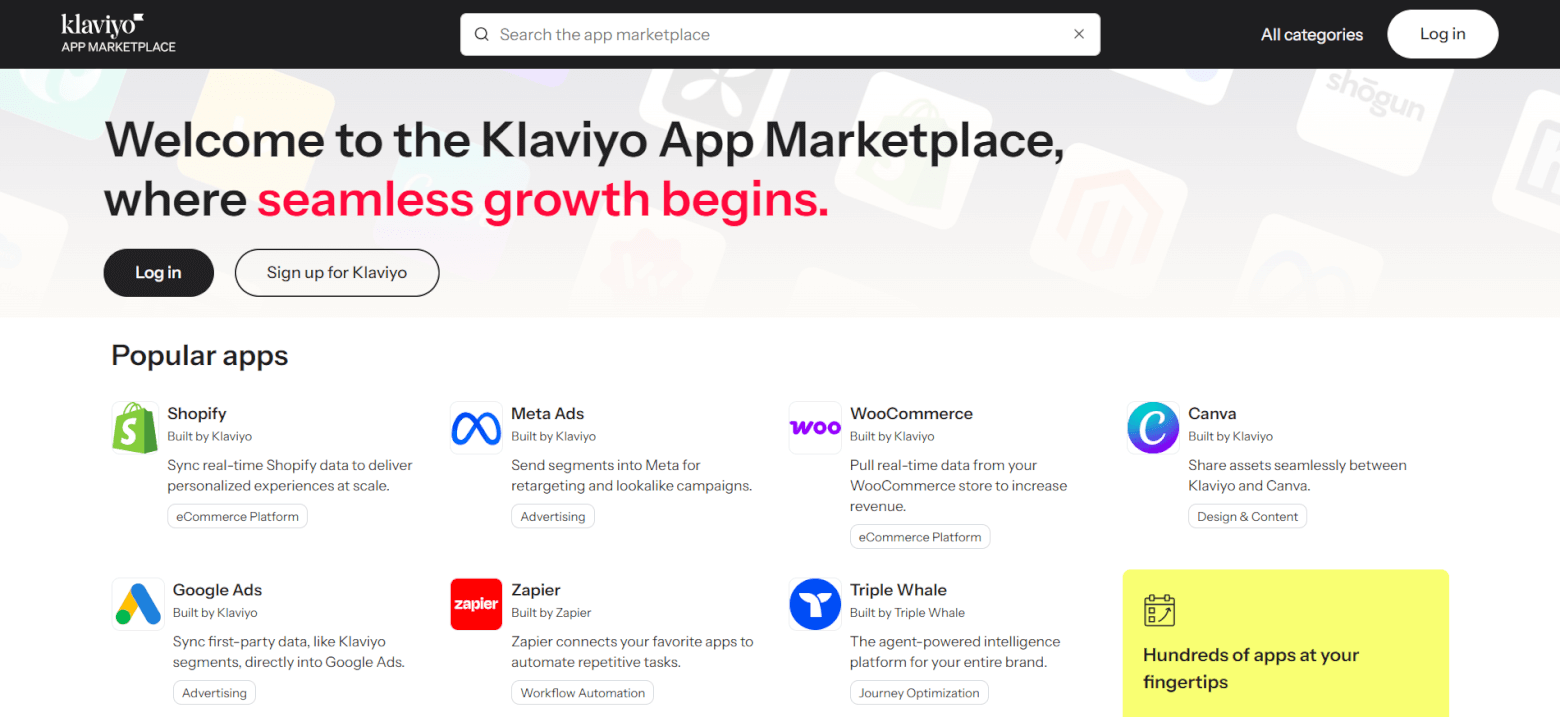
Importantly, both platforms integrate with all the major ecommerce platforms, including Shopify, WooCommerce, BigCommerce, and Magento. So, as long as your store runs on one of these, you shouldn’t have a problem integrating it with Brevo or Klaviyo.
Can’t find an integration you need? Don’t fret. You may be able to integrate Brevo or Klaviyo with the third-party app using the Zapier middleman integration platform.
Winner: With both platforms offering a similar number of integrations, including integrations for all major ecommerce platforms, I’m calling it a tie.
Brevo 7 – Klaviyo 5
Pricing
Comparing Brevo and Klaviyo’s pricing can be tricky. That’s because Brevo charges for email sends, while Klaviyo charges for the number of active profiles you have (with a cap on monthly email sends).
To make a more equivalent email marketing cost comparison, I assumed that one active profile gets five emails per month — one welcome email, plus a couple of newsletters or automated ecommerce emails.
I ended up with this pricing table (all prices are based on monthly billing):
| Number of active profiles (or monthly email sends) | Brevo | Klaviyo
(Email plan or Email + mobile messages plan, assuming you don’t need mobile messaging credits) |
|---|---|---|
| 250 (or 1,250 monthly email sends) | Free (300 emails/day, or roughly 9,000 monthly email sends) | Free |
| 1,000 (or 5,000 monthly email sends) | Starter: $9/mo
Standard: $18/mo Professional: $499/mo (150,000 monthly email sends) |
$30/mo (10,000 monthly email sends) |
| 2,000 (or 10,000 monthly email sends) | Starter: $17/mo
Standard: $35/mo Professional: $499/mo (150,000 monthly email sends) |
$60/mo (25,000 monthly email sends) |
| 4,000 (or 20,000 monthly email sends) | Starter: $29/mo
Standard: $69/mo Professional: $499/mo (150,000 monthly email sends) |
$100/mo (10,000 monthly email sends) |
| 8,000 (or 40,000 monthly email sends) | Starter: $39/mo
Standard: $84/mo Professional: $499/mo (150,000 monthly email sends) |
$150/mo (50,000 monthly email sends) |
| 20,000 (or 100,000 monthly email sends) | Starter: $69/mo
Standard: $129/mo Professional: $499/mo (150,000 monthly email sends) |
$375/mo (200,000 monthly email sends) |
Looking at the numbers, Brevo is typically the more affordable platform for up to 20,000 active profiles and 100,000 monthly email sends. It generally becomes more expensive only if you go for the Professional plan, which starts at $499/mo for 150,000 monthly email sends.
Do run your own numbers, though, in case my five-monthly-emails-per-active-profile assumption doesn’t work for you.
The features you need also influence the plan you pick (and hence your overall email bill).
If you don’t need mobile messages, Klaviyo’s Email and Email + mobile messages plans cost exactly the same. I would pick the Email + mobile messages plan in this case, because you get the full extent of Klaviyo’s features, including multi-channel segmentation, attribution, and A/B testing.
Otherwise, if you’re on a budget, go with Klaviyo’s free plan. This plan doesn’t include generative AI features, and you get access to customer support for only the first 60 days.
Meanwhile, Brevo’s free plan includes generative AI and marketing automations (for up to 2,000 contacts). Upgrade to the Starter plan to unlock paid features like 100,000 monthly email sends, the option to remove Brevo branding (for an extra $10.80/mo), and web push notifications.
As for the next-tiered Standard plan, you get perks like AI send time optimization, three user seats, and one landing page — yes, only one. 😅
For more landing pages, up to 10 user seats, full omnichannel marketing, access to popups, and more, go for the eye-wateringly expensive Professional plan.
Winner: Brevo’s our winner, for its generally more wallet-friendly pricing. (It’s no wonder it’s won our Best Email Marketing Tool For Value For Money badge for 2023, 2024, and 2025!)
Brevo 8 – Klaviyo 5
Brevo vs Klaviyo: Final Thoughts
The outcome of the Brevo vs Klaviyo comparison is clear: Brevo wins!
Brevo’s ease of use, powerful automations, flexible segmentation, and value-for-money pricing are just some factors that make it our overall winner. This is especially true if you’re new to email marketing and want a user- and budget-friendly email service provider.
But this isn’t to say Klaviyo isn’t worth using.
With its extensive range of email templates and ecommerce automation capabilities, Klaviyo is a great choice for ecommerce store owners — especially ones familiar with email marketing. The platform’s strong deliverability support doesn’t hurt, either.
While I hope this review has helped you decide, the best way to confirm if Brevo or Klaviyo is right for your business is to test them for yourself. Get started here:
Still on the fence? Our guides on the best B2B email marketing software and the best email marketing for ecommerce might point you in the right direction.
And if you have questions on Brevo, Klaviyo, or anything email marketing-related at all, drop them in the comments section below. We’ll get back to you!
Our Methodology
This article has been written and researched following our EmailTooltester methodology.
Our Methodology



